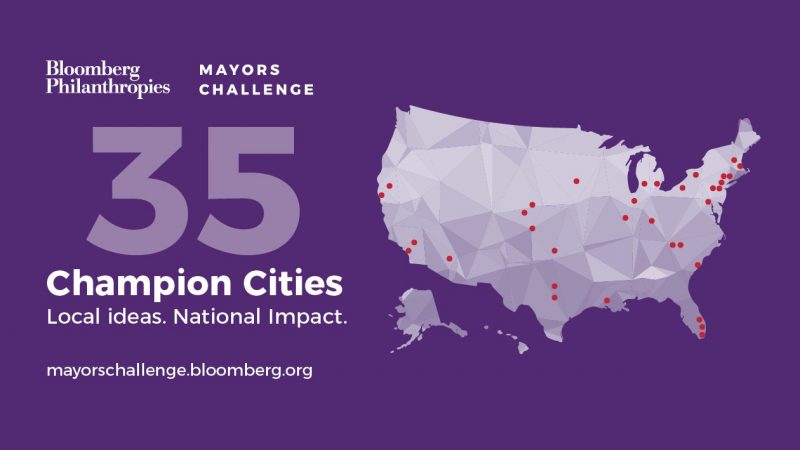“Innovation” could be municipal government’s middle name. When it comes to creativity and resourcefulness – city leaders take a backseat to no one.
Local public officials don’t have the luxury of living on the periphery of problems. Instead, they live in the middle of every issue on a daily basis. They, unlike state and federal officials, are easily accessible.
Perhaps that’s what has caused them to be innovative and creative in finding remedies and solutions. Or, perhaps these traits are a result of dealing with the largest problem of all – inadequate funding. Whatever the reason, municipal leaders have become known for out-of-the box thinking, innovative problem solving and visionary collaboration.
So, when Bloomberg Philanthropies announced its 2018 U.S. Mayors Challenge and dangled financial awards of up to $9 million, there was immediate interest. The annual Mayors Challenge seeks innovative ideas for addressing tough challenges and more than 320 cities lined up to compete. The race is now underway.
One grand prize winner will receive $5 million which to is to be used in implementing a solution to a serious condition that has the potential to adversely affect residents’ lives. Four finalists will each receive $1 million in funding.
A list of Bloomberg’s recently announced 35 Champion Cities can be found here.
 In addition to the $9 million that will be awarded, each city finalist will receive up to $100,000 which is to be used to establish a public prototype of their ideas. City leaders will receive feedback from officials in other cities and will be offered support from innovation experts. Over the next six months, each of the prototypes will be tested and in October five winners will be announced.
In addition to the $9 million that will be awarded, each city finalist will receive up to $100,000 which is to be used to establish a public prototype of their ideas. City leaders will receive feedback from officials in other cities and will be offered support from innovation experts. Over the next six months, each of the prototypes will be tested and in October five winners will be announced.
Not only will the innovations of the projects result in benefits to citizens, but the objective is to share the ideas and innovative solutions.
Two Texas cities – Austin and Georgetown – were named finalists. Georgetown is the first city in the state to purchase 100 percent of its power from renewable sources. That’s a remarkable accomplishment but there’s more. City officials now plan to lease residential and commercial rooftop space to install solar panels so that additional renewable energy sources will be available to the city.
The city of Austin is experiencing historic growth and innovation is a necessity. While the city is grappling with all kinds of issues, there is a genuine desire to find solutions. Austin plans to use blockchain technology to help enable homeless residents of the city to retrieve their personal records at any time in order to access critical services.
Cities, the primary drivers of national economic growth, tend to be more collaborative and more inclusive with citizen participation. It’s interesting to take a quick look at what problems have taken priority in a few of the cities that made the list of finalists.
Cheyenne, Wyo., will reinvent its city with private-sector partners. City leaders hope to match owners of vacant and underutilized commercial properties downtown with entrepreneurs who are eager and able to revitalize the areas.
Because of its genuine commitment to resiliency, the city of Coral Gables, Fla., is developing a plan designed to keep citizens from losing power or being denied emergency assistance when storms or other disasters occur. The plan will incorporate the use of smart solar-powered micro-grids that will prioritize the distribution of power during an emergency.
The city of Louisville, Ky., and the Jefferson County Metro area will join forces to increase the use of a number of new technologies. One approach to improving public safety will be to step up the region’s use of drones.
Hats off to Bloomberg for the recognition and funding that the Mayor’s Challenge program affords. Good luck to each of the finalists – reaching this stage of the competition is quite an accomplishment.
Strategic Partnerships, Inc. (SPI) is leading the way in the rapidly expanding area of public-private partnerships. Learn about SPI’s service offerings in both the public and private sectors by contacting them today.






